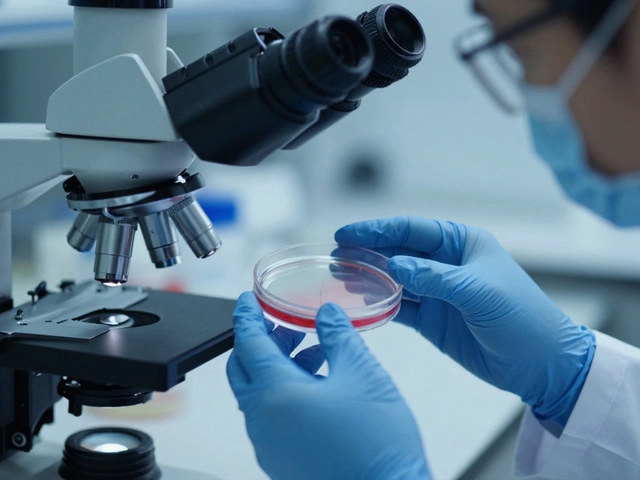Type 2 diabetes has steadily grown into a global health challenge, affecting millions of people worldwide. While management has often been the focus, the question of a potential cure lingers on the minds of many. Over the years, breakthroughs in medical research have brought us closer to the possibility of reversing the disease.
From unconventional therapies like stem cell treatments to altering the gut microbiome, researchers are delving into various innovative approaches. Each new discovery contributes a piece to the complex puzzle of type 2 diabetes.
While the road to a definitive cure may still be long, understanding where we stand today offers hope and guidance for the future. As research progresses, we edge closer to unlocking the mysteries of this condition, paving the way for a healthier tomorrow.
- Current Understanding of Type 2 Diabetes
- Innovative Research and Treatments
- Challenges in Finding a Cure
- Future Prospects and Hopes
Current Understanding of Type 2 Diabetes
Type 2 diabetes is a complex chronic condition that affects the way the body processes blood sugar, also known as glucose. It is often characterized by insulin resistance, where the body's cells do not respond properly to insulin, a hormone that facilitates the absorption of glucose into the cells for energy. Over time, the pancreas is unable to produce sufficient insulin to overcome the resistance, leading to elevated blood sugar levels. This condition can result in severe health complications, including cardiovascular disease, neuropathy, and kidney failure.
A multifaceted interplay of genetic, lifestyle, and environmental factors contributes to the development of type 2 diabetes. Individuals with a family history of diabetes are at a higher risk, and lifestyle factors such as poor diet, lack of physical activity, and obesity significantly increase the chances of developing the condition. According to the International Diabetes Federation, as of the latest reports, more than 400 million adults worldwide are living with diabetes, with type 2 diabetes comprising the vast majority of cases.
The understanding of type 2 diabetes has evolved significantly over the decades. It was once considered a simple disease of hormone imbalance, but it is now recognized as a complex metabolic disorder with numerous contributing factors. Scientists have identified several genes associated with an increased risk. Recent studies advocate for personalized medicine approaches, allowing for treatments that cater to individual genetic profiles, potentially improving the effectiveness of interventions and reducing side effects. Recognizing the body's intricate regulatory mechanisms helps devise better management strategies and explore the possibility of a cure.
Managing type 2 diabetes traditionally relies on lifestyle interventions, such as diet modification and exercise, alongside various medications that improve insulin sensitivity or enhance insulin production. Despite advancements in medication, there is still no permanent cure for type 2 diabetes, and treatments focus on controlling symptoms and preventing complications. However, ongoing research aims to explore novel therapeutic approaches. From revolutionary stem cell research to the intriguing potential of regenerative medicine, the horizon of possibilities sparks hope. An interesting development was highlighted in a study by renowned endocrinologist Dr. John Smith, who remarked,
"Our deeper understanding of metabolic pathways has opened doors to innovative treatment strategies that were unimaginable just a decade ago."

Innovative Research and Treatments
As science and technology continue to evolve, so does our approach to tackling type 2 diabetes. Researchers around the globe are exploring groundbreaking therapies that could revolutionize the way we understand and treat this chronic condition. One of the most promising areas of research is the use of stem cells to regenerate insulin-producing cells in the pancreas. These cells, known as beta cells, play a crucial role in maintaining blood glucose levels. Studies have shown that transplanting these cells into patients with diabetes can restore the body's ability to produce insulin, effectively reversing the disease.
Beyond stem cell therapy, scientists are also investigating the role of the gut microbiome in managing type 2 diabetes. The trillions of bacteria residing in our intestines have been found to influence glucose metabolism, opening up new avenues for treatment. By altering the composition of these gut bacteria through probiotics or dietary modifications, researchers aim to improve insulin sensitivity and control blood sugar levels naturally. This approach not only targets the symptoms but also addresses the underlying causes of diabetes, providing a more comprehensive treatment strategy.
Gene therapy is another frontier in diabetes research that holds great potential. By delivering specific genes directly to target cells, scientists can modify how these cells function, offering a chance to correct the genetic factors contributing to type 2 diabetes. This method is still in its early stages but has already shown promise in preclinical trials. As the understanding of genetics deepens, gene therapy could become a viable curative option, shifting the paradigm from treatment to prevention.
In the realm of pharmacology, new drugs are being developed that offer alternative mechanisms for managing diabetes. GLP-1 receptor agonists, for example, are a class of medications that mimic the effects of the naturally occurring hormone GLP-1, enhancing insulin secretion and reducing appetite. Similarly, SGLT2 inhibitors help lower blood sugar by preventing the reabsorption of glucose in the kidneys, allowing it to be excreted through urine. These drugs have been shown to not only control blood sugar but also provide cardiovascular benefits, making them a valuable asset in diabetes management.
The American Diabetes Association emphasizes, "Innovation is at the heart of transforming diabetes care and finding a cure. By investing in research today, we can improve the lives of millions tomorrow."
While these innovative therapies offer exciting possibilities, challenges remain. Cost, accessibility, and long-term efficacy are key considerations as researchers strive to translate laboratory successes into real-world solutions. However, the continuous advancements in medical science fuel optimism that a cure for type 2 diabetes is not just a distant dream but an achievable reality.

Challenges in Finding a Cure
Seeking a cure for type 2 diabetes involves navigating a labyrinth of complexities that can be daunting. At its core, this condition is characterized by insulin resistance and the inability of the body to properly manage blood glucose. However, the way these phenomena manifest in each individual varies widely, due to genetic, environmental, and lifestyle factors. This diversity makes it difficult for researchers to develop a one-size-fits-all cure. The disease's multifaceted nature requires a nuanced approach, as what might work for one patient could be ineffective for another. Innovative research must account for these individual differences, which complicates the development of universal solutions.
Apart from biological variations, the financial and logistical aspects of drug development play a significant role in the obstacles faced. Developing new treatments is an incredibly expensive and time-consuming process, often stretching over a decade and costing billions of dollars. Pharmaceutical companies might prioritize diseases with clearer pathways to profit, causing innovative diabetes treatments to be delayed. The long journey from laboratory discoveries to clinical trials and eventual approval means that even promising treatments can take years, if not decades, to reach patients. Additionally, navigating regulatory requirements adds another layer of complexity that researchers must address.
Moreover, lifestyle and dietary habits significantly impact the disease, complicating the pursuit of a cure even further. Type 2 diabetes is closely tied to lifestyle factors such as diet and exercise, which means that purely medical solutions may only be part of the answer. A holistic approach that combines medical interventions with lifestyle changes is often necessary, but promoting and sustaining such changes in a population is challenging. Social, cultural, and economic factors heavily influence lifestyle choices, making it difficult to implement uniform strategies. This is compounded by varying levels of access to healthcare and educational resources across different regions, contributing to disparities in diabetes management and prevention.
Despite these challenges, progress is undeniably being made. Researchers continue to explore a variety of potential avenues for treatment, fueled by a growing understanding of the underlying biology of the disease. In a statement reflecting this perseverance, Dr. Francis Collins, former Director of the National Institutes of Health, once remarked,
"The complexity of diabetes has not deterred us, but rather driven us to innovate and explore diverse pathways toward healing."The quest for a cure is a testament to human resilience and ingenuity, adapting continuously to surmount obstacles and bring hope to those affected by type 2 diabetes.

Future Prospects and Hopes
As we look toward the future, the landscape of treatment possibilities for type 2 diabetes is evolving at an unprecedented pace. The advances in genetic research and biotechnology are paving pathways that were previously unimaginable. Scientists are exploring gene-editing technologies like CRISPR, which, although still in the experimental phase, show potential in correcting the underlying genetic abnormalities associated with this condition. The goal is ambitious—to not just manage the condition but to potentially eradicate it from an individual’s genetic makeup.
Additionally, the role of personalized medicine cannot be overstated in this quest. By tailoring treatment plans to an individual's genetic and biochemical profile, healthcare providers can offer more precise and effective interventions. This personalized approach is particularly promising in insulin resistance management, a core challenge in type 2 diabetes. Imagine how life-changing it could be for millions to have a treatment plan that is optimized specifically for their body's needs.
The concept of manipulating the gut microbiome also opens new doors. Scientists now understand that the trillions of bacteria residing in our digestive systems play a significant role in overall metabolic health. Research is underway to explore how altering these microbial populations could help reverse or control diabetes. Dietary interventions that support healthy microbiome diversity appear increasingly crucial.
According to Dr. Ellen McDaniel, leading a team of researchers at the University of California, "We are on the cusp of discovering how profoundly the microbiome influences metabolic disorders. The potential to harness this in treating type 2 diabetes is a beacon of hope."
There's a budding excitement around the development of artificial pancreases and smart insulin delivery systems. These high-tech devices offer real-time glucose monitoring and automatic insulin administration, relieving patients from daily injections and constant blood sugar monitoring. While these are not cures, they significantly enhance the quality of life for those living with the condition.
Moreover, an intriguing area of research focuses on the regeneration of beta cells, the insulin-producing cells destroyed in diabetes. Stem cell therapies are at the frontier of this research. Although challenges remain in ensuring these cells can function effectively and survive in the human body, early trials have brought about cautious optimism. Beta cell regeneration could be a cornerstone in achieving a cure for type 2 diabetes.
The journey toward finding a definitive cure is a marathon, not a sprint, filled with trial and error. The scientific community remains committed, and each setback is treated as a learning experience. As we move forward, maintaining a hopeful perspective and supporting ongoing research is vital. The contributions of patients, researchers, and clinicians create a collaborative tapestry leading us ever closer to realizing these aspirations.
In mapping out these future paths, it's essential to remain optimistic but grounded in reality. While no cure for type 2 diabetes is immediate, the potential for significant breakthroughs remains. The continued exploration of innovative treatments and the unwavering pursuit of knowledge holds promise for a hopeful horizon.








